I was on the fence as to whether I should cover this 1966 Chevrolet Chevelle SS396. I’m not really a muscle car fan and have been as outspoken as any about the insane price heights these cars, and others of its ilk, have reached. No mistake, I’m a capitalist at heart and one should make hay while the sun shines but the continuing upward price pressure leaves me shaking my not-so-swift-anymore head. Regardless, this example is so original and unmolested, that I had to bite – it’s just the way Chevrolet intended it to be 56 long years ago. And I owned a very similar ’67 edition so that played into my decision as well. This unspoiled specimen is located in Pleasanton, California and is available, here on eBay for a current bid of $33,600 with reserve not yet met. There is a BIN price of $68,995 available too.
The story is that this Fremont, California assembled Chevelle came out of a collection and has been sparingly used over the years. The mileage recording is 70K miles but there is no claim to that being an authentic accumulation but it’s not hard to imagine that it is accurate. This Chevy is as close to a survivor as you can get but I’ll hold off on that declaration as this car is wearing a repaint, albeit in its original Lemonwood Yellow hue. Beyond that, suddenly it’s 1966 and nothing is out of place. Even its skins are ’66 vintage bias-plies (though Chevrolet makes no mention of red-stripes being available that year). Capping off the exterior presentation is a set of RPO N96 “Mag-styled” wheel covers. One last point, note the rear valance panel, it’s body color in this case. According to Chevelle Stuff, the earliest ’66s had a black panel, and then, later on, they were finished in body color (this example was assembled the second week of March 1966). The one exception, supposedly, is found on cars that were built in Atlanta where the black finished valance panel was restarted near the end of the model year. The entire matter is apparently one of continuing debate.
Standard power is courtesy of a 325 gross HP, 396 CI “Turbo-Jet” V8. The engine appears in its original form right down to its single-snorkel, chrome topped air cleaner (though the extra oil fill cap on the driver’s side valve cover is not correct). The engine alpha code and sequence number check out as a matching number powerplant and the seller states, “We serviced this car and did the brakes, it is ready to drive and enjoy“. The assumption is that it runs as expected but at this price point I’d forget about assumptions and go for facts. You can row the gears in this Chevelle as it is equipped with a four-speed manual transmission shifted via an original style Muncie, reverse lock-out shifter.
The strato-bucket seat interior appears as perfect with the only noted exception being the bucket seat hard-backs having their chrome trim edging painted black. The seller refers to this car as being in “restored condition” so perhaps the interior has had a redo. Regardless, it needs nothing. It even has its original Delco AM radio.
The best aspect of this car is that it exists as is without having undergone obtuse “improvements”, also known as cheesy hot-rodding antics. The down-side is that it’s so nice, it’s really a collector’s piece not likely to be used, at least in no more than a minimal way. It’s now more an investment than a car. No, I wouldn’t want to own it but I’m grateful to be able to experience it and when I find a similar example at a car show, it still makes me smile.
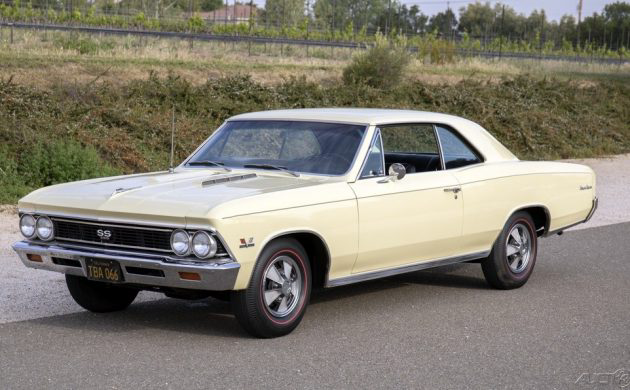
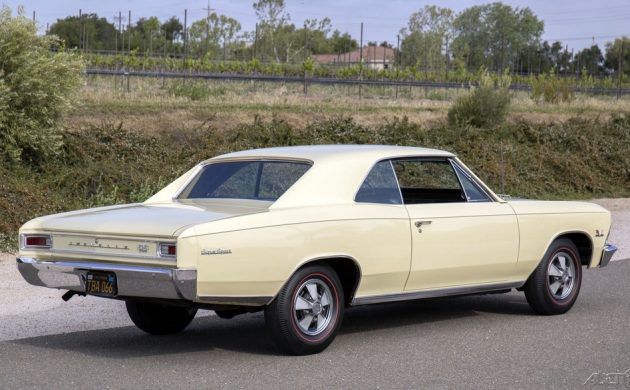
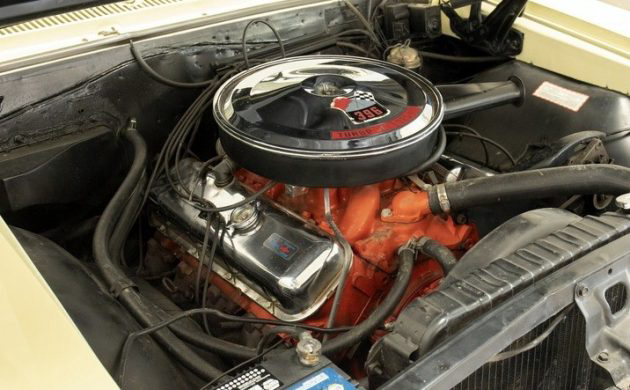
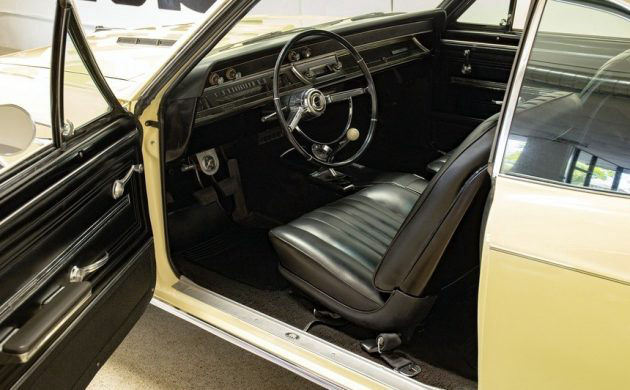
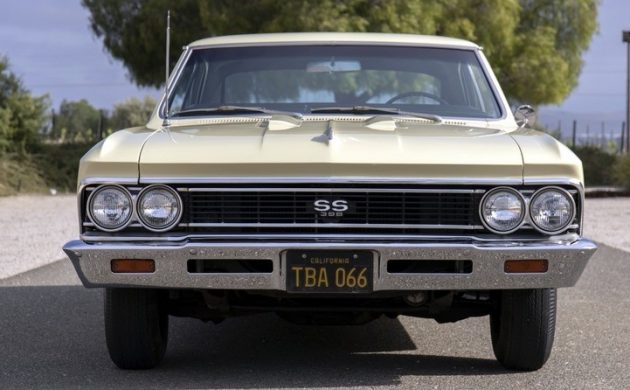






You absolutely without a doubt must continue to feature these beautiful machines . Sure it’s overpriced but , I mostly come here for the insight .
I agree with Bud.
These days the word musclecar is painfully overused and misused to describe practically any car made before 1980.
Here we have the true definition. Unassuming, not a stripe in sight and no day-glo colors.
Friend of mine had a 66 SS396 with a 4-speed and was painted a dark copper , or a reddish Brown color with Black interior. One of the nicest cars in the day and was a quick ride. He said the 396 put out 360HP as an option back then when his folks bought the car. His parents had money but the family never flaunted their success.
‘Muscle car is never a dirty word’. Keep em’ coming..
Redline tires and Crag 5 spokes required.
Turning 16 in 1966 meant getting a driver’s license on your birthday. I drove a muscle car later that year, thanks to a friend named Lonnie Ludwig, who had bought an SS396 identical to this one, except for the back panel being black. No frills, fast, and a blast to drive. Unforgettable. Thanks again, Lonnie!
This car is almost identical to the one I owned except mine was blue with black vinal top. As for the red line tires they were available in 66 as mine had them and they were the original tires that came on the car with those original mag style hub caps. Don’t know where my car was built but the rear valance was also blue. Inside was bench seat with knee knocker tach and L-78 engine with 4 speed shifter. This is one car that needs to be seen as it looks the way it came off the assembly line at G.M. As for the prices of these cars going skyward, what isn’t these days!
As to this portion of the write-up: “According to Chevelle Stuff, the earliest ’66s had a black panel, and then, later on, they were finished in body color (this example was assembled the second week of March 1966). The one exception, supposedly, is found on cars that were built in Atlanta where the black finished valance panel was restarted near the end of the model year. The entire matter is apparently one of continuing debate.”
the claim that ANY 66 SS’s was built with factory black tail panels (other than black cars of course) is a total urban legend.
As to early cars, the showroom album did have pre-production ILLUSTRATIONS (not pictures) with black SS tail panels, but there was an insert page issued for the album BEFORE THE FIRST CARS WERE SHIPPED to dealers which states that the black SS tail panel was eliminated. And I have an ORIGINAL press release package sent out by Chevrolet, with the ORIGINAL pictures still in it, all of which the SS’s without the black tail panel. The date on the pics and the cover letter is BEFORE the first car was shipped to a dealer.
Lastly, numerous very early cars still wearing their original paint have surfaced without black tail panels. Not a single solitary one (other than a black car) has surfaced with a black tail panel. So the “early car” story is simply not true.
The “late Atlanta car” story was made up out of thin air years ago by a guy who restored his car with an incorrect black tail panel and then concocted the tail to defend it. That was pre-intenet days when no one could easily prove that it was all BS.
This is proven by the fact that I have seen, and have pictures of, an ORIGINAL PAINT Atlanta built SS that has a VIN that is less than 200 from the LAST car built at Atlanta in 1966 production. So it was built the last day of production (or the next to last day, at the earliest). It is many many thousands of cars AFTER the car that the BS story was originally made up to defend.
Did some dealers paint them black? Possibly. Did some owners paint them black shortly after purchase? Probably. But unless and until a non-black original paint 66 SS shows up with a black tail panel, and an inspection verifies that it was not done later (yes, there are ways to tell), then there is absolutely no evidence whatsoever that there was ever a non-black 66 SS that left the factory with a black tail panel.
Man, I just walked out of the thrift store today with a 66 Chevelle plastic promo car, or at least that’s what I thought it was. After looking at the very small letters, it looks like it says Skylark! However, the body is like this 66 Chevelle with suttle differences, ie; side trim running the length of the car on both sides right below the door handles, side vents just behind the front wheel wells, two hood vents running left to right on the forward part of the hood. Did Buick make a car that looked just like this Chevelle in 66? I also bought a 65 Buick Skylark promo car, but at least that one looks quite different even though it shares the body style.